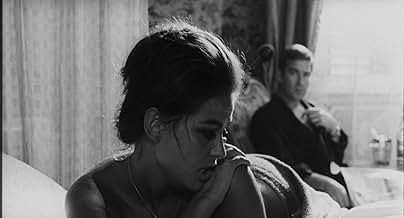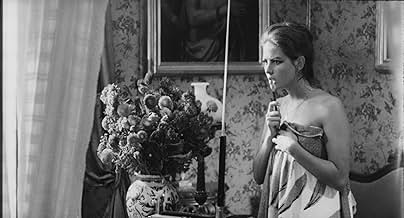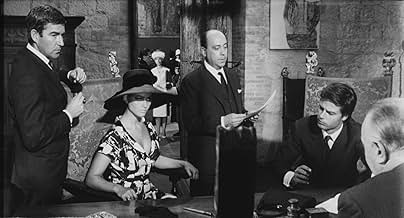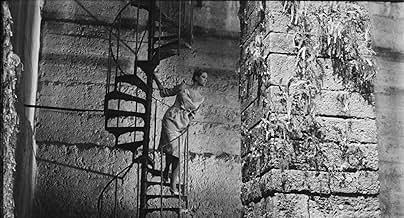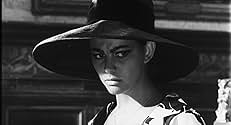Adicionar um enredo no seu idiomaSandra returns to her childhood village to take care of family business, but her childhood memories and secrets soon overcome her.Sandra returns to her childhood village to take care of family business, but her childhood memories and secrets soon overcome her.Sandra returns to her childhood village to take care of family business, but her childhood memories and secrets soon overcome her.
- Direção
- Roteiristas
- Artistas
- Prêmios
- 3 vitórias e 2 indicações no total
- Party Guest
- (não creditado)
- Party Guest
- (não creditado)
Avaliações em destaque
The unknown "Vaghe Stelle dell'Orsa..." is another great movie of this artist called Luchino Visconti. The plot about incestuous relationship and family issues in the hands of another director could have become a melodramatic soap-opera. But Visconti explores the sensuality and beauty of Claudia Cardinale to deliver an intriguing and quite erotic family drama without any redemption. The set decoration, as usual, is another piece of art, supported by a classy music score. My vote is eight.
Title (Brazil): Not Available
The film is typical Visconti--a well-to-do upper class family returning to the childhood manor, picking up the memorable pieces of a rich and comfortable past before the World War II (literally in the film, the sale of valued paintings, property, and in this film, a garden that needs costly upkeep forcing the family now to gift it to the townsfolk as public property). Touches of Visconti's and Lampedusa's "The Leopard" made just before this film.
The original head of the family, Sandra's father was a Jew, and executed by the Nazis. He was exposed as a Jew by his wife, a famous pianist who fell in love with a lawyer. Sandra suspects the lawyer and her mother for her father's demise. Visconti never reveals why the Nazis spared the family members. Now Sandra's mother is demented and her father's statue in the garden is always covered in a white sheet giving the suggestion of a ghost. But the film is not about ghosts.
The film is more about Sandra (Cardinale) and her brother Gianni (Sorel) who reveal an past that might never have been consummated. Now that Sandra is married to Andrew (Craig), Gianni removes the wedding ring from Sandra's finger and wears it, Sandra's protests unheeded.
Visconti's script reveals that Sandra had a lover, Antonio (who still adores her, played by Ricci), but they could not marry because of the class divide and opposition from her mother to the relationship. Years later Antonio becomes a doctor who treats Sandra's demented mother.
While the film is not about ghosts, it is about a dark past, bitter memories, class and religious conflicts, that struggle to keep pace with the world outside the Italian town with a rich history. An electra complex emerges like a ghost--Visconti's images of Cardinale's body (especially her eyes that wonder who is outside her bedroom door) are absolutely top notch. There is no overt sex, no on screen and even the spoken words deny more than underscore it. you wonder about Sandra's mother if she is truly demented when she accuses her daughter Sandra of slithering in like a serpent.
Every bit of the film makes you wonder as you clutch at the straws the director throws as clues for the viewer to solve a big puzzle. The poem which provides the original Italian title of the film is one, There are more Solve them and you will love the film. Deserving of the Venice honor. Thank you, Cardinale and Sorel, for your unforgettable screen time in this film. A film that anticipates Visconti's "The Damned" and "Conversation Piece."
Luchino Visconti's Sandra (1965), is a puzzling but splendorous visual treat that depicts incest, homo-eroticism, madness and collaboration with the Nazis. Its fairly slow pacing and reluctance to make obvious useful information will challenge those who spend hours a day gazing down at their QWERTY devices. However, "Sandra" is very rich and satisfying; it is flawlessly served up by the great Visconti. (I like it more than "The Leopard.")
A modernized retelling of the Greek myth Electra, an attractive, upper-class, socialite couple (Claudia Cardinale in the eponymous role, Michael Craig as her husband Andrew) return to the mansion of Sandra's youth (which she was forced to flee), to attend a small ceremony honoring her father, who was murdered by the Nazis at a concentration camp. When she is reunited with her unstable brother, Gianni (Jean Sorel), the physical connection between them is made very obvious. Their closer-than-normal relationship is never a secret to the audience, but revealing it is a big concern to Andrew and other observers, such as Sandra's barrister stepfather Gilardini (Renzo Ricci). The perpetually nervous Gilardini and Sandra's clinically insane mother (Marie Bell) may also have collaborated with the Nazis by betraying Sandra's father, creating an unusual conflict of pairs.
Shot in high-contrast Black and White, Visconti's skill at shooting his photogenic cast in tight quarters is evident. Because the English translation of the film is somewhat talky, it helps to develop the skill of quickly reading the subtitles in order to enjoy Visconti's work. It is amazing how precise and detailed the imagery is. The scenes between the anguished brother and steely sister are frequently filled with erotic tension. Visconti's trademark homo-eroticism is also present, but to a smaller degree.
One of the more interesting characters is Sandra's "first love" who is now a physician. He seems to personify not just a mixture of Sandra's husband and her brother, but also the Nazi collaborator Gilardini. At least, that's my interpretation of the final image.
Visconti's depiction of a decaying aristocratic family has great depth, and fans of the great director will not be disappointed with it.
Você sabia?
- CuriosidadesOne of the first films in which Claudia Cardinale, who was born in Tunisia and whose first language was French, dubbed herself in Italian.
- Citações
Gianni Wald-Luzzati: Why can't you be honest for once? Did God tell you to become a nun? Did he tell you to get married and that would satisfy you? Did he tell you that nun's are sick with desire and frustration? That they're willing to mortify their flesh? Now, why must you torment yourself? Why should you fill so full of guilt? So wretched and alone?
- Trilhas sonorasPrelude, chorale and fugue
Written by César Franck
Principais escolhas
- How long is Sandra?Fornecido pela Alexa
Detalhes
- Data de lançamento
- Países de origem
- Central de atendimento oficial
- Idiomas
- Também conhecido como
- Sandra
- Locações de filme
- Geneva, Canton de Genève, Suíça(opening sequence: party at Sandra and Andrew's apartment)
- Empresas de produção
- Consulte mais créditos da empresa na IMDbPro
Bilheteria
- Faturamento bruto mundial
- US$ 927
- Tempo de duração1 hora 45 minutos
- Cor
- Mixagem de som
- Proporção
- 1.66 : 1
Contribua para esta página


